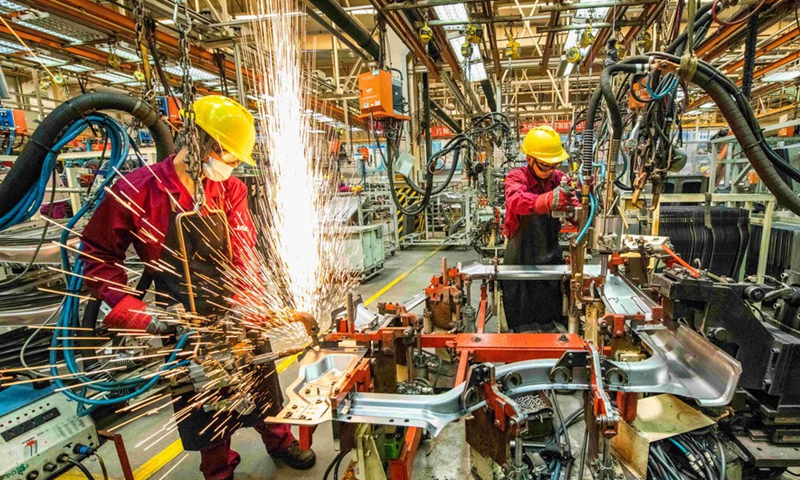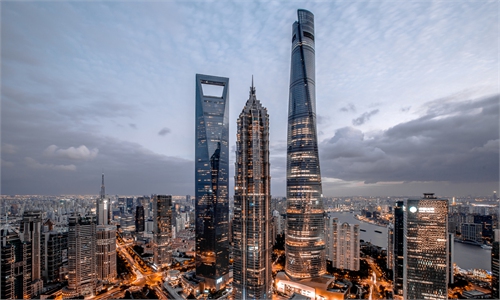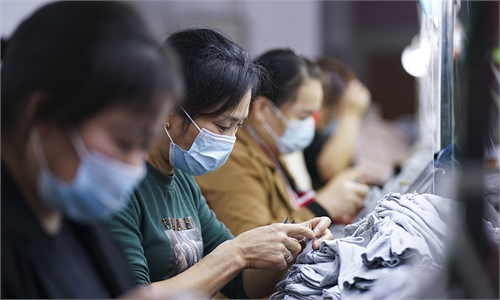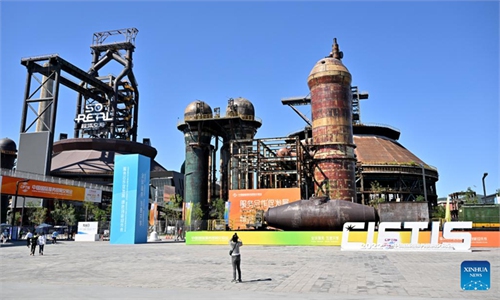China's NDRC vows more measures to attract foreign investment
Nation 'still a top destination' for investors despite smear

Workers weld at a workshop of an automobile manufacturing enterprise in Qingzhou City, east China's Shandong Province.File Photo:Xinhua
China's top economic planner said on Thursday that it will soon roll out more policies and measures for the manufacturing sector, aiming to increase foreign investment, further adding to a slew of measures China has already taken to stabilize its economy, trade and foreign investment.
In order to increase foreign investment, China will press ahead with the 2022 edition of the Catalogue of Encouraged Industries for Foreign Investment, which will further expand the scope of encouragement and guide foreign investment in key areas such as manufacturing and producer services, the National Development and Reform Commission (NDRC) said on Thursday.
A special working team mechanism for major foreign-funded projects will be further improved, while China will accelerate the implementation of the first five rounds of foreign-funded projects, the NDRC said.
The announcement came after a government meeting on Wednesday urged to further stabilize the economy in the fourth quarter. Chinese officials called for concrete measures to ensure that the economy remains balanced and within a reasonable range.
Prior to this, China has issued and implemented packages of policies to boost and stabilize economy, trade and foreign investment.
The effectiveness of the policy packages to stabilize the economy will continue to show up in the fourth quarter and even in the first half of 2023, Hu Qimu, deputy secretary general of digital-real economies integration forum 50, told the Global Times on Thursday.
China is still focusing on the long-term development of the layout of policy, such as new-energy vehicle consumption incentives, which will be extended until the end of next year, said Hu.
Under the impact of the US' Federal Reserve's aggressive interest rate hikes, the global economy is facing increasing uncertainty, China's economic stability and resilience have created predictability, Li Yong, deputy chairman of the Expert Committee of the China Association of International Trade, told the Global Times on Thursday.
As one of the positive effects brought by China's intensive policies, trade enterprises' confidence has improved in the third quarter, according to a trade survey report by the China Council for the Promotion of International Trade released on Thursday.
Total export orders are expected to be flat from last year, also impacted by sporadic epidemic and the Ukraine crisis, Li Yansong, a manager of Guangzhou Magi-Wap Culture Articles Co, told the Global Times. The company's main customers are from the US, Europe and Australia.
Retail sales rose 5.4 percent in August from a year earlier. Service consumption has gradually recovered, with food and beverage revenue up 8.4 percent year-on-year in August, the Ministry of Commerce (MOFCOM) said on Thursday.
Meanwhile, China's actual use of foreign capital increased 16.4 percent year-on-year from January to August, standing at 892.74 billion yuan ($124.06 billion), statistics from MOFCOM showed.
In particular, investment from EU rose by 123.7 percent on a yearly basis, in contrast to claims made in the annual position paper released by the EU Chamber of Commerce in China (EUCCC) on September 21, which alleged that China's standing as a promising investment destination has retreated and its central role in global supply chains was at risk.
According to Hu, the EU's manufacturing costs have soared to an unsustainable level, resulting from stubbornly high inflation, the US' irresponsible rate hikes and high energy costs. This will highlight the critical importance of China's supply chains.
Li Yong also noted that China's State Council had been working on improving domestic business environment, while the current business environment in Europe is deteriorating.
In May, CCPIT established a working group for foreign companies in China, which has provided a new channel and more convenience for foreign enterprises to express their requests and solve their difficulties. This will strengthen the confidence of foreign enterprises to take root and develop in China, said CCPIT on Thursday.
Despite downward pressure, the problems that currently face China are short-term shocks that will not lead to systemic risks, Hu said. "The resilience of the Chinese economy means that China has a lot of room for adjustment," said Hu.



